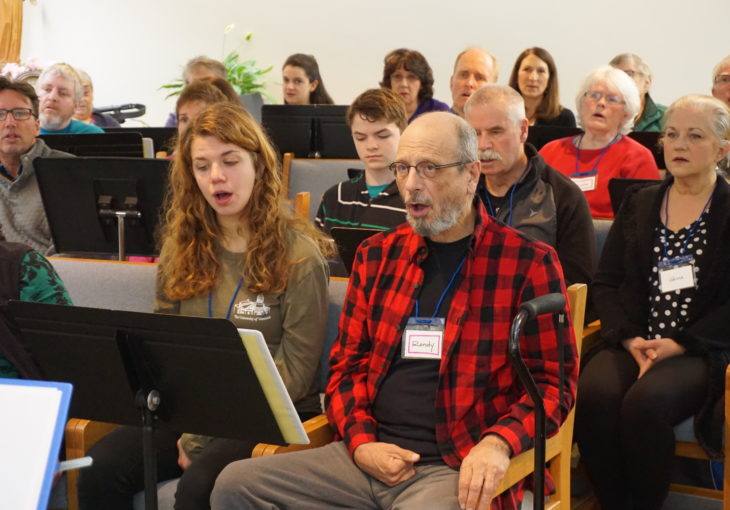The Aphasia Choir of Vermont is being honored by the American Stroke Association for their contributions to the stroke community by being named the winner of the first national Stroke Hero Awards in the Outstanding Group division.
Stroke is the fifth leading cause of death and a major cause of disability in the U.S. Yet millions of survivors, caregivers and supporters overcome the challenges stroke presents each day. This year, the American Stroke Association, a division of the American Heart Association, the world’s leading voluntary health organization devoted to fighting cardiovascular disease and stroke, is honoring stroke survivors, heath care professional and family caregivers from around the U.S. through the inaugural Stroke Hero Awards.
Six years ago, Karen McFeeters Leary, a speech-language pathologist and singer/songwriter, started the first aphasia choir in Vermont. The choir started with 22 members and has grown to 55 members including 27 stroke survivors, 1 traumatic brain injury (TBI) survivor, family, spouses, University of Vermont students studying communication sciences, a physical therapy assistant, speech-language pathologists, and the director.
Aphasia is a language disorder that affects the ability to communicate. It is most often caused by strokes that do damage in the left side of the brain, which typically controls speech and language functions. Because music is largely mediated by the right side of the brain, individuals with aphasia can sing and are often fluent while singing even if they have severe difficulty speaking or are nonverbal. Bringing these individuals together in song enables them to experience freedom of expression in a context that fosters social connections and a sense of belonging.
Karen starts each rehearsal by highlighting the life and accomplishments of the members. During their annual performance each June, in honor of National Aphasia Awareness Month, the members of the choir introduce songs in order to demonstrate to the audience the effect aphasia has on language ability. The audience experiences how it may be hard for them to speak, but when the music comes on the lyrics can flow. Choir members also educate the public on aphasia by offering communication strategies and suggestions, such as telling the audience to be patient and let the person finish talking instead of interrupting them. The Aphasia Choir of Vermont has become a place for stroke and TBI survivors to form a supportive community.
Strokes don’t discriminate. They can happen to anyone, at any age – and about one in four people worldwide will have one in their lifetime. For more information, visit www.Stroke.org/HeroAwards. To get involved with the American Stroke Association locally, please visit www.heart.org/Vermont.
